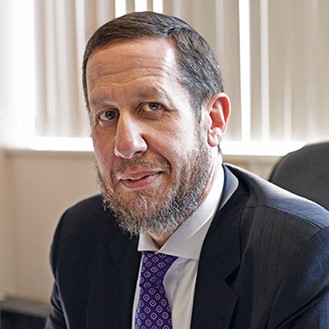
THE JEWISH VIEW ON SOCIALISM
Dear Rabbi
Can you sum up the Jewish perspective on socialism? Is the Corbyn model really so wrong? Doesn’t Judaism encourage the idea of “sharing the wealth” with others? Isn’t Capitalism really just another form of greed, so not in keeping with Jewish mores?
Andrew
Dear Andrew
An economics professor at a local college made a statement that in all his years he had never failed a single student but that recently he failed an entire class. He went on to explain why. That class had insisted that Jeremy Corbyn’s’ vision of socialism worked and that no one would be poor and no one would be rich, essentially a great equalizer.
The professor then said, “OK, we will have an experiment in this class on this ideological plan”. All grades will be averaged and everyone will receive the same grade so no one will fail and no one will receive an A (substituting grades for £’s something closer to home and more readily understood by all the students).
After the first test, the grades were averaged and everyone got a B. The students who studied hard were upset and the students who studied little were happy. As the second test rolled around, the students who studied little had studied even less and the ones who studied hard decided they wanted a free ride too so they studied little. The second test average was a D! No one was happy.
When the 3rd test rolled around, the average was an F. As the tests proceeded, the scores never increased as bickering, blame and name-calling all resulted in hard feelings and no one would study for the benefit of anyone else.
To their great surprise, everyone failed and the professor told them that socialism would also ultimately fail because when the reward is great, the effort to succeed is great, but when government takes all the reward away, no one will try or want to succeed.
There are five morals to this story:
1) You cannot legislate the poor into prosperity by legislating the wealthy out of prosperity.
2) What one person receives without working for, another person must work for without receiving.
3) The government cannot give to anybody anything that the government does not first take from somebody else.
4) You cannot multiply wealth by dividing it!
5) When half of the people get the idea that they do not have to work because the other half is going to take care of them, and when the other half gets the idea that it does no good to work because somebody else is going to get what they work for, that is the beginning of the end.
Sure, there is a notion of giving a certain percentage of our income (a tenth) to help others. This in keeping with the principle of recognising that despite all our efforts, ultimately what we have is on account of G-d compassion and benevolence. At the same time the Rabbis insist that one should not typically give away more than one fifth of one’s income, so that there is more to retain for oneself whereby more can be made, and thereby more good can be done. So in short, Judaism has a certain socialist aspect to it, while maintain a capitalist approach no less. To put it differently, Judaism encourages us to be “kosher Capitalists.” That about sums it up.
A SACRED SISTERHOOD
Dear Rabbi
I was recently in attendance at a funeral of a friend. Another mutual friend approached me at the funeral and started to tell me how she was involved in the preparation of the body for burial and went into some details which shocked me. I, by no means, solicited the information. Is this right?
Eleanor
Dear Eleanor
Those entrusted with attending to the dearly departed are known as the Chevra Kaddisha – otherwise translated as sacred brother or sisterhood. So-called because it is indeed a sacred task. It is dealing with the most sensitive situation that requires devotion, compassion and discretion. It is commonly referred to as the ultimate kindness, because it is done entirely on a volunteer basis and it is something the recipient can obviously not reciprocate. One of the cardinal rules of this sacred task is that no conversation takes place while engaged in the process other than that relevant to the process. And no information is shared outside the room – ever.
If you are able, without causing offence, you might want to point out to this friend the error of her ways. Alternatively, to mention to the head of her team to be alert to the fact that this happened – without mentioning names, and that perhaps the team needs some classes and retraining.
PRE MARTIAL NERVES
Dear Rabbi
I am due to get married in a couple of months but I am starting to reconsider. To be sure, I am forty-three and the way I figure, if I made it this far on my own, why do I want to change all that now?
Alex
Dear Alex
Marriage is an institution, and who wants to live in an institution, right? Or as someone else once put it: “Matrimony is not a ‘word,’ it’s a ‘sentence.’ Cynicism aside, the Torah is pretty clear as to the fact that “it is not good for man to be alone.” So G-d Himself encourages the notion of marriage. And frankly, the fact that you even entertained the idea and held onto it until this point suggests that you too appreciate the inherent value of matrimony. Only you’re getting jitters and looking for excuses to bail. Here’s the bottom line: It’s true it is a single most selfless act because you are taking your life, until now entirely your own, and committing it to someone else. But then again, she is doing exactly the same thing. And two people selflessly committing themselves to one another, is a single most beautiful and sacred act. Furthermore, she is your soulmate – which by definition means, you remain eminently incomplete without her. So find some other way to deal with the pre-marital jitters and stay focussed on the end goal. Last case scenario – find a couple of reliable friends, tell them about your concerns and insist of them that no matter what they should drag you kicking and screaming to the Chupah.
Oh, and send me an invite. I’d love to see that!









